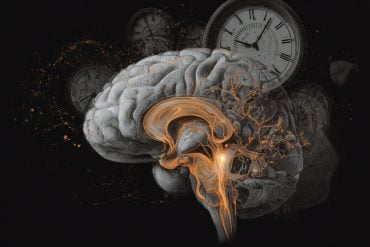Summary: Researchers tapped into ChatGPT-4’s capabilities to generate personalized narratives from stream-of-consciousness inputs. In a study, participants found the AI-generated narratives accurate, revealing, and insightful about their own identity. The AI was fed thoughts akin to diary entries, generating detailed personal narratives from as little as 50 inputs. The tool is envisioned not as a therapist replacement, but as a catalyst to deepen understanding between therapists and clients.
Key Facts:
- 25 out of 26 participants rated the AI’s generated narratives as mostly or completely accurate.
- The study also demonstrated that ChatGPT-4 can provide plausible coaching strategies based on these narratives.
- The technology is being explored for its potential in speeding up mutual understanding in therapy, allowing for more in-depth work.
Source: University of Pennsylvania
Research has shown that personal narratives—the stories we tell ourselves about our lives—can play a critical role in identity and help us make sense of the past and present. Research has also shown that by helping people reinterpret narratives, therapists can guide patients toward healthier thoughts and behaviors.
Now, researchers from the Positive Psychology Center at the University of Pennsylvania have tested the ability of ChatGPT-4 to generate individualized personal narratives based on stream-of-consciousness thoughts and demographic details from participants, and showed that people found the language model’s responses accurate.
In a new study in The Journal of Positive Psychology, Abigail Blyler and Martin Seligman found that 25 of the 26 participants rated the AI-generated responses as completely or mostly accurate, 19 rated the narratives as very or somewhat surprising, and 19 indicated they learned something new about themselves. Seligman, the Zellerbach Family Professor of Psychology, is the director of the Positive Psychology Center, and Blyler is his research manager.
“This is a rare moment in the history of scientific psychology: Artificial intelligence now promises much more effective psychotherapy and coaching,” Seligman says.
For each participant, the researchers fed ChatGPT-4 recorded stream-of-consciousness thoughts, which Blyler likened to diary entries with thoughts as simple as “I’m hungry” or “I’m tired.”
In a second study published concurrently in The Journal of Positive Psychology, they fed five narratives rated “completely accurate” into ChatGPT-4, asked for specific interventions, and found that the chatbot generated highly plausible coaching strategies and interventions.
“Since coaching and therapy typically involve a great deal of initial time spent fleshing out such an identity, deriving this automatically from 50 thoughts represents a major savings,” the authors write.
Abigail Blyler and Martin Seligman, Zellerbach Family Professor of Psychology and director of Penn’s Positive Psychology Center.
Blyler, the first author and a student in the Master of Applied Positive Psychology Program, shares more about the studies in a Q & A.
Q: What are personal narratives, how do they shape identity, and what is their role in therapeutic approaches?
Stories of the self, the way people talk about the journey of their lives and who they are, is really what pulled me into psychology. I’ve come to understand that these narratives impact our behaviors, how we view the world and others, and, importantly, our well-being. One thing Marty [Seligman] and I have discussed a lot is, How do we get to knowing what our narratives are? Narratives help to construct a coherent story, make sense of everything in our lives.
We found that ChatGPT was able to, with just 50 of those thoughts and very basic demographic information, come up with a highly accurate and detailed personal narrative. This could be a tool for helping people gain self-insight. We see this as something that can be used in the therapeutic context, not as something that would replace a therapist.
Can the coach use this to help understand the client better, and can the client in turn understand themselves better? We’re hoping there’s this reciprocal relationship, where this speeds up the process of getting to mutual understanding, so the deep work can take place.
Q: How did you come up with the idea of using ChatGPT-4 to create personal narratives?
I really credit Marty [Seligman]. He has been such a leader in the field of positive psychology for so long. To me, he is the paragon of curiosity, particularly when it comes to the cutting-edge, and so he’s been really steeped in the things that people are doing with AI and psychology. The idea came from a series of discussions we were having around my interest in personal narratives, asking, What are the things we’re consistently telling ourselves? Might that give us a window into the narratives that play on a loop in people’s minds? Can AI be of use here?
Q: The personal narratives were generated from 50 stream-of-consciousness thoughts the participants recorded. What instructions were they given?
We didn’t give any description of what the content of the thoughts should be, just that they should be fairly automatic. We asked that people try not to edit them in their minds. We gave them the option to record it via a voice memo or write it down in a Word document or Notes app. However they chose to do it, we gave them 48 hours to just collect 50 of them.
Q: How did you determine the coaching strategies and interventions ChatGPT-4 generated were highly plausible?
We based it on the literature. There are very many evidence-based therapeutic interventions, and what the machine does here is select the ones that seem most appropriate to the narrative identity. This research is exploratory; there is absolutely a need to continue the research and deploy this with coaches. That’s where we are now, getting this into the hands of coaches. We have just begun collaborations to find out if therapy and coaching are more effective when assisted by our new methods.
About this artificial intelligence and psychology research news
Author: Erica Moser
Source: University of Pennsylvania
Contact: Erica Moser – University of Pennsylvania
Image: The image is credited to Neuroscience News
Original Research: Open access.
“AI assistance for coaches and therapists” by Abigail Blyler et al. Journal of Positive Psychology
Open access.
“Personal narrative and stream of consciousness: an AI approach” by Abigail Blyler et al. Journal of Positive Psychology
Abstract
AI assistance for coaches and therapists
We found previously that ChatGPT-4 could use 50 stream-of-consciousness thoughts to make the latent construct of narrative identity explicit. We now demonstrate this as a tool for interventions by coaches and therapists. Using five narrative identities, ChatGPT-4 recommended actionable strategies and interventions tailored to the narrative identity.
Artificial intelligence (AI) can thus support coaches and therapists by crafting personalized approaches drawing on the person’s narrative identity. This new assistive tool may help clients achieve greater insight, growth and well-being.
Abstract
Personal narrative and stream of consciousness: an AI approach
The personal narrative is a construct said to embody personal identity and so influence thought and guide behavior. Therapists and coaches draw on such personal narratives to explain maladaptive thoughts and to foster clients’ insights.
We combined artificial intelligence (AI) with stream-of-consciousness to make the latent construct of personal narrative explicit.
Adult participants (n = 26) contributed 50 stream-of-consciousness thoughts, which along with demographic details and our prompts, were processed by ChatGPT-4 to create a personal narrative.
Participants evaluated these AI-generated narratives for accuracy, surprise, and insightfulness, reporting high accuracy, surprise, and increased self-insight.
Twenty-five of the 26 participants rated the narratives as ‘Completely Accurate’ or ‘Mostly Accurate’,19 rated the narratives as ‘Very Surprising’ or ‘Somewhat Surprising’, and 19 indicated that they learned something new about themselves. This suggests that AI can support self-discovery in therapy and coaching.








